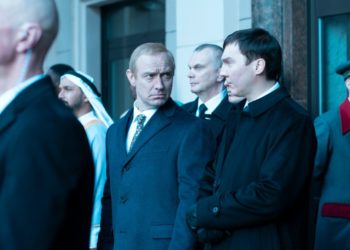In October 2006, an early winter storm buried western New York under two feet of snow, knocking out power to more than 300,000 homes as temperatures plunged below freezing. Local agencies were overwhelmed. That was the first time I mobilized with the National Guard for domestic-disaster response. We did what Americans expect the Guard to do: Neighbors in uniform arrived with trucks, generators, and training to help our communities recover.
That deployment demonstrated a compact that has defined the National Guard’s legitimacy for generations: In extraordinary times, citizen soldiers mobilize to reinforce civilian authority and protect their neighbors. But over the past six months, that trust has shattered. Guardsmen have been called up to fulfill roles far outside their intended purpose, in ways that don’t deliver safety and instead escalate tensions in the very neighborhoods they’re meant to protect. They’ve been sent to L.A. to support immigration enforcement and deployed to Washington, D.C., to address an alleged crime crisis. They may soon be organized into specialized units to travel the country for crime suppression and protest control.
The image of the Guard is no longer one of neighbors helping fill sandbags and issuing warm blankets after a storm. It’s soldiers standing post on city streets, functioning as police by another name.
I served as a combat engineer in the Army National Guard, where I trained as part of a team that would respond in the case of an attack that used weapons of mass destruction. Our job was clear: pull people from rubble, decontaminate the area, and stabilize the injured. We operated under a civilian incident commander, never questioning whom we were helping or what politics they held. That clarity shaped my understanding of the National Guard: It exists to support, not supplant, civilian institutions.
What is happening today breaks that model and continues a decades-long trend. For some time, politicians at both the federal and state levels have treated the National Guard as a catchall solution to avoid investments in public infrastructure. In 2022, New Mexico called up its National Guard to serve as substitute teachers; in 2021, Massachusetts activated its Guard as bus drivers; and in 2020, the governor of New York had the National Guard serve as New York City garbage collectors. Now the Trump administration is using state troops to fill gaps in law-enforcement capacity without the accountability, training, and community trust that real policing requires.
This trend is dangerous for American democracy. Using the National Guard as the stopgap for every underfunded or politically difficult issue blurs the line between supporting civil authorities and wielding coercive force. It also hollows out civilian capacity: Political leaders who use the military to patch up social problems are deferring the lasting solutions that these problems require. Instead of building a pipeline of educators, school districts have their governor call up troops as teachers; instead of modernizing sanitation systems, municipal leaders get soldiers to haul trash.
But perhaps the most important loss is trust. The National Guard’s moral authority rests on showing up when lives are on the line and then standing down when the crisis ends. The country’s Founders understood this deeply. George Washington’s Newburgh Address to his officers, in 1783, and his later decision to relinquish his commission enshrined the principle of civilian control. Today, as Americans see Guardsmen deployed in roles that resemble policing, that trust frays. Service members also feel the dissonance. One member of the California National Guard told me that they were proud to be called up in January to support firefighters during the Palisades Fire. When this member was activated again just six months later, as part of a federal mobilization that ordered the National Guard to support immigration enforcement, they saw the earlier warm welcome and relief on the faces of L.A. residents replaced by dread. Trained for combat and disaster response, members of the National Guard now find themselves cast as occupiers in their own communities.
Leaders justify these deployments as responses to exigent circumstances, such as a shortage of police to fight rising crime. But crime is a policy problem with deep social roots. It requires sustained civilian work: officers accountable to neighborhoods, courts that move cases fairly, and social services that address addiction and poverty. Soldiers can make a show of force on city streets, but real public safety requires strengthening ties of trust across communities and providing reliable due process. Do we really want to live in a country where troop presences substitute for actual governance, and civic problems are met with military deployments?
The national-security costs of using the Guard in this way are real too. For three decades, Guardsmen have rotated through seemingly never-ending deployments to Kosovo, Iraq, Afghanistan, Syria, Ukraine, and the Horn of Africa. Adding domestic-policing duties to the list of responsibilities degrades the Guard’s readiness for missions that only the armed forces can perform. Washington is asking too much of its citizen soldiers.
Governors and state legislatures control when and how their National Guard is used. They can reclaim their units for their intended functions by drawing bright lines around law-enforcement-style deployments, especially in other jurisdictions. If the White House requests that governors send their National Guard on missions that involve controlling nonviolent protests, providing a show-of-force presence, or augmenting routine policing, the presumed answer should be “no.” When National Guard support is genuinely necessary, state leaders must insist that federal missions be bound by clear conditions and objectives, with public and transparent guidance on matters such as how and when force can be used and how long a deployment will last.
The president could choose to override state leadership and federalize the Guard. But in that case, absent a true emergency, governors of both parties across the country should show solidarity with one another by refusing to voluntarily contribute troops, and Congress must assert its authority and vote to end the deployments quickly.
The National Guard has become the “force of first resort” for leaders at both the state and federal levels, in part because of chronic underinvestment in civilian institutions. Rebuilding those systems—schools, sanitation, public health, local law enforcement—is the hard, unglamorous work of governing. But doing so is the only way to preserve the National Guard’s emergency role and strengthen the democracy it exists to protect.
The National Guard is a powerful force when it arrives on a disaster scene to save lives, but an uneasy one when it is turned against civilians. Most of its members are motivated by service, not ideology. Misusing the Guard to manage political or social conflict will weaken its capacity to be what it is meant to be—a lifesaving, community-based force of last resort.
The post What We Lose by Distorting the Mission of the National Guard appeared first on The Atlantic.




